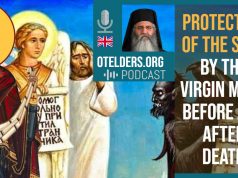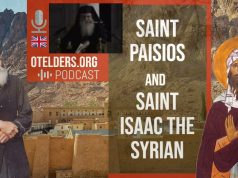In this episode, Metropolitan Neophytos of Morphou comments on the famous quote: “If you die before you die, when you die, you won’t die”.
This English translation of the sermon of His Eminence Metropolitan Neophytos of Morphou during the 2nd “Lighting the lighter of the saints” Spiritual Dialogue Meeting with His Eminence, 14 April 2019, was provided by the ‘Metropolitan Neophytos of Morphou Homilies’ YouTube channel and was presented for otelders.org by Porphyrios from the ‘Orthodox Treasures YouTube Channel.’ The meeting was hosted by the Renewal Committee of the Church of Panagia Kataphygiotissa in Platanistasa and took place at the event hall of the Holy Church of God’s Wisdom (Agia Sophia) in Strovolos, Cyprus.
Met. Neophytos:
[Question]: Do the departed have constant contact with the world and their loved ones?
Are they aware of what happens on earth?
Can they hear us?
[His Eminence]: Yes.
A moment, Giota. [Let’s answer this now].
[Of the departed], only the righteous who dwell in the light of God, in heaven,
— they don’t feel any sorrow.
God doesn’t allow for them to feel sorrow.
I am well aware that
my mother didn’t just enter heaven, but she has become a saint.
She has become a saint — for certain reasons.
She can see my messes, my mistakes, my passions
and sometimes she might even show me things,
but God doesn’t allow for her to feel sorrow.
They have no wrinkles, they don’t suffer from old age.
They are young [in heaven].
My mother died at 94 years old.
If you see her now,
she is a beautiful woman with big, beautiful eyes.
I don’t remember my mother looking like this.
She gave birth to me when she was 40 years old.
She was old and tormented her whole life.
But these torments didn’t just cleanse her soul
— they made her a saint.
Therefore, the departed feel and understand.
Without doubt, they do.
The ones who are in agony, fear, concerns are the damned ones.
God allows them to be in distress,
fearing that they may end up in the “place of torment”
“The parable” of the rich man and Lazarus is not a parable — it is a real story.
The damned are in agony
The righteous pray.
They transform distress into prayer,
and thus, they are never saddened.
Never!
Besides, [quoting the memorial service]:
“Where there is no pain, no sorrow, no sighing,
but life everlasting.”
The words spoken by the priests in the services are truthful .
They are not theories.
They are reality.
[Ms. Pitta]:
So another question asks.
Could you briefly explain the phrase:
“If you die before you die, [when you die, you won’t die]”?
These are very deep spiritual questions.
[His Eminence]: All of them “deadly.”
[Ms. Pitta]: And there is also one more question regarding the Holy Communion.
Is the Holy Communion a reward for our spiritual efforts or a medicine to help us?
[His Eminence]: This is a good question. Thank you.
You know, when I said the questions are “deadly,”
I apologize — it was a figure of speech, and a bit of dark humor.
For the past 20 years, I’ve been visiting
several high schools in the area.
What we’re doing now is similar to
what I do with students,
especially the 11th graders —
they’re at the perfect age for this.
They write their questions,
their professor brings them to me,
and then I divide them into groups,
so I can answer them more quickly.
Later, I go to the class and I discuss them [with the students].
Students, nowadays, ask me the same kind of questions
I would get asked 20 years ago.
Today, the children of “the internet generation,”
still ask the same [fundamental] questions.
The first major group of questions concerns death.
“What’s the afterlife like?”
“Can the departed see us?”
“Do they have a relationship with us?”
“How can we help them?”
The second group deals with love and relationships.
They are young, so naturally that’s what they want to ask about.
As a matter of fact, it’s better for them to learn a few things from their bishop (“despotis”),
instead of learning them from any “stray” (“a-despotos”)
who wants to take advantage of them
— especially the girls.
I met many of the girls years later, and they told me:
“We were hearing your voice in our heads
“when we were about to have an abortion.”
You had told us:
“My girls, don’t stain your hands with your children’s blood.”
“Depression will hunt you.”
“And we listened —
“and we went as far as the doctor’s office,
“but then turned back.
“We chose to raise kids outside wedlock rather than abort them.”
You see how helpful this interaction is.
So, the second group of questions was about love.
And the third group [of questions] is the one regarding witchcraft and demons.
Kids learn about these things online
and through peers who engage with such practices.
Regarding the phrase:
“If you die before you die, when you die, you won’t die”
it was not said by any Orthodox saint,
although you’ll find it displayed [on a sign],
if you go to Stavrovouni [Monastery].
It is actually a wise saying by some wise Arabs.
The East has long cultivated this aphoristic wisdom.
[As the Greek poet Giorgos] Seferis says,
“I speak to you in fairytales and parables”
“because you listen to them more sweetly.”
So, these wise people from Persia
understood that there is [a different kind of] death,
— the death of the soul.
The death of the soul occurs
when the soul stops fighting against its passions [vices].
We say that the soul is immortal,
for immortal is the opposite of mortal.
Immortal is he who knows no death.
But when the soul wearies or falls in despair
or abandons the fight against its passions,
that’s when it begins to taste death.
Then comes the gravest danger:
bodily death comes knocking on the door
and finds us unprepared for the eternal life.
This is one way to interpret the “if you die, before you die” proverb.
That’s one interpretation.
There is another more Orthodox-aligned interpretation.
If we succeed in killing the carnal mindset inside us while in this life,
then “when we die, we won’t die.”
Because we’ve already undergone a transformation from a carnal to a spiritual phronema (mindset).
This is where love for Christ is needed.
A deep love for Christ.
And then a different question comes up,
which we already discussed the other day in Akaki.
As a matter of fact, I was astonished that there were many young people who asked me,
“My bishop, how does our love for Christ become stronger?”
This is a very important question!
Nowadays, the young people of Cyprus
— through the internet —
have drained the cup of every passion.
Thus, by age 30, they feel ready for retirement.
They come knocking on our door and say,
“You, the bishop who speaks so much — what’s your take?
“How do I acquire a desire so strong that beats all other desires?
“[Desires] for money, for glory, for flesh…”
This is our time — our time!
And know this:
With each passing year,
more and more people would find interest in these homilies.
Will we be able to offer something to them?
[next question]:
“Is Holy Communion a reward for our spiritual efforts or a medicine to help us?”
The second one.
It is medicine.
It is medicine.
“None of those attached to the earth is worthy.”
Unless the priest says the prayer of the Cherubicon,
[paraphrasing]: “My Christ, I am unworthy to perform the Liturgy
“and receive the Holy Communion,”
he can’t stand in front of the Holy Table.
Same thing goes for me, the deacon and every layperson.
That’s why one thing we need to take in serious consideration
is the realization of our own unworthiness.
Unfortunately, in the past, some “Christian” groups
and the attitude of some people
— even clergy from within the [Orthodox] Church —
fostered self-righteousness:
“I am righteous.”
“I am not like the neighbour,
“who drinks,
“who divorced his wife,
“who is a bad guy.”
If such people also happened to fast and pray a bit …
maybe even went to Sunday school,
they felt that they were righteous,
that they were good people.
One woman from Katokopia came to me for confession one day.
I told her, “You are a good person, but you have a nose even taller than mine.”
“Me?” she said.
“Yes, you.”
“Me?”
“Yes, you.”
She stood up and left.
As she walked away,
I said to her, “You will come back.”
Three years later… she returned.
She told me, “I changed five spiritual fathers,
“but none were as honest about my passions as you.
“I’d rather hear the truth,
“even though you are bitter tongued sometimes.”
“And you shall know the truth, and the truth shall make you free,” [John 8:32]
Now, the Holy Communion is never a reward.
[Besides], “So likewise, when you have done all those things […] say,
‘We are unprofitable servants.'” [Luke 17:10]
No matter what you accomplish,
never think yourself important.
Instead, find ways to cultivate [the awareness of] your unworthiness.
My mother, the rumoured saint, Milia, taught us this lesson well.
While my father’s family tended to boast
about their virtues,
my mother was taught by her own mother the opposite—
to recognize the flaws in every generation.
She would tell me,
“Son, you got the love of learning from [my side],
“but also, the quick temper and abruptness that easily ‘wounds’ others.
“You got that from me and you need to be careful with it.”
Even as a bishop,
she would still speak of these things to me.
Once, a woman saw a photo of me as a layman.
“Who is this?” she asked my mother.
“It’s the bishop,” my mother replied, “when he was still a student.”
“What a handsome boy he was!” the woman said.
“Not at all …”
“He’s too tall and his nose is too large.”
“My other son — the one who died — was the handsome one.”
Do you understand?
She would always find ways to humble us.
Elder Symeon, here in Cyprus, in Mavrovouni,
would permit her to enter the Altar,
where only the Fathers are allowed.
“Don’t allow her in the Altar,
“the other Fathers will be jealous,
“that you only let my mother in,” I told him.
And he said, “But I don’t let her in because she’s your mother.
“I let her in because she is Milia and she can humble us all.
“Since you [Fathers] ignore my corrections,
“you might listen to hers.”
Indeed, she would name what it’s one of us was missing.
The result was that the first two times we reacted poorly.
But by the third time, we would consider her words.
In this way, everyone loved her.
And everybody knew that if they got close to her,
they would get a revelation about themselves.
But you enjoyed it, because it was therapeutic.
How can you operate on a wound, unless it’s first opened?

 Română
Română
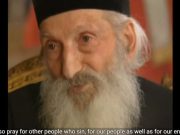



















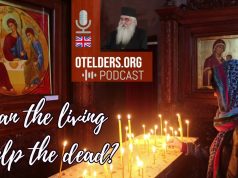

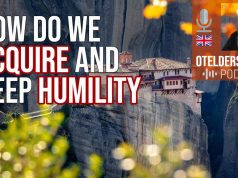


![Spiritual Tears: A Profound Journey with Metropolitan Athanasios of Limassol [Podcast] otelders Podcast Tears In God](https://otelders.org/wp-content/uploads/2023/10/otelders_podcast_tears-238x178.jpg)
